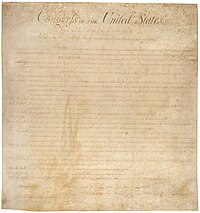 We had another constitutional milestone to commemorate this September.
We had another constitutional milestone to commemorate this September.On September 25, 1789, the 1st U.S. Congress sent twelve constitutional amendments to the states for ratification. This was completed on December 15, 1791. The first ten became our Bill of Rights. The United States had become a nation.
Many outspoken proponents of U.S. independence from Great Britain were fervent anti-Federalists. Patrick Henry was a strong opponent. Good Lord, we had just fought a long and bitter war to secure our independence, and now we should turn around and become again subjects of a powerful central Federal government? We had our Articles of Confederation between the states; people were doing fine. A Federal government would only diminish the power of the states; maybe eventually make them disappear altogether.
However, the formation of a Bill of Rights was supported by many anti-Federalists, including John Hancock. They saw that a recitation of citizens’ rights would serve as a powerful antidote against any central government’s attempt to usurp states’ authority. A Bill of Rights would be our protection against large, corrupt government.
I feel that maybe a lot of deals were struck in state legislatures during the ratification process. The Federalists felt that a Bill of Rights would vastly improve citizens’ confidence in a new government: it didn’t have carte blanche to do whatever it wanted.
Yesterday, I heard the expression “Bill of Rights” on a radio news show. It really caught my ear! If you think about it, we don’t hear the expression all that often. The fact that the first ten amendments are our Bill of Rights may not be recognized all that often either. Also, these amendments are referred to by number, such as the 1st, freedom of speech, the 2nd, right to own weapons, etc.
What concepts do these amendments predominantly contain?
1. No restriction by Congress on free speech, religion, the press, the right to assemble.
2. The right to own weapons.
3. Military can’t be billeted in peoples’ homes, without permission. This was very pertinent at the time of our revolution.
4. No unreasonable search and seizure. This amendment has received a lot of attention because of car searches.
5. No accusation for a crime without a formal indictment. Due process. No double jeopardy. No taking of private property for public use without just compensation. The latter has received a lot of attention. The emphasis is on just.
6. A speedy and public trial. To see witnesses. Counsel for defense. Right to counsel was treated quite casually until the Gideon decision in 1963.
7. Trial by jury.
8. No excessive bail. No cruel or unusual punishment.
9. Certain rights not denied to the people. All the rights not set out by the government.
10. States’ rights.
I have not found the Bill of Rights printed independently from the Constitution in sources I’ve used, except in the classic Miracle at Philadelphia*.
Looking over this list, I’m going to say that the Supreme Court spends a lot of time debating the meaning and limitations of amendments 1, 2, 4, 5, and 10.
All of the amendments have over the years been legally examined, debated, tweaked, and even restricted. It depends on the philosophical make-up of the current court. Many amendments have been added since 1791. Certainly, our 13th amendment outlawing slavery and involuntary servitude would find a place in the Bill of Rights today.
Most of the Bill of Rights is taken more or less for granted by us. This is good, because it shows that the bill is firmly a part of our national structure. A lot of the world doesn’t have a semblance of a Bill of Rights, including no freedom of speech, no free press, no freedom of assembly, no speedy public trial. What a permanent credit to so many individuals at the time of our revolution who saw the Bill of Rights as protection against repressive and corrupt government.
People propose adding new amendments all the time, often for the most partisan of issues. Let’s resist this urge! Amendments should be few and far between. Otherwise, we’ll be forced to double the size of the Supreme Court to figure out what all this new legislation really says. – Renata Breisacher Mulry
Reading:
*Miracle At Philadelphia: The Story of the Constitutional Convention May - September 1787.
Gideon's Trumpet
Retained by the People: The "Silent" Ninth Amendment and the Constitutional Rights Americans Don't Know They Have

 Buy Flags at Sears
Buy Flags at Sears


No comments:
Post a Comment